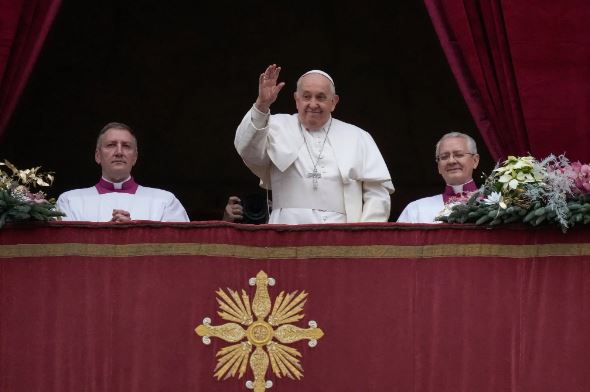Pope Francis delivered his Christmas address on Monday, emphasizing the violence in Israel and the war in Gaza. He expressed deep concern about the loss of civilian life and sorrow in Bethlehem, traditionally known as the birthplace of Jesus. The pontiff called for the release of Israeli hostages and an end to devastating military attacks. Speaking from a balcony of St. Peter’s Basilica in Rome, he delivered his “Urbi et Orbi” (to the city and to the world) Christmas blessing to a large crowd.
While calling for peace globally and addressing conflicts in various regions, Pope Francis focused prominently on the situation in Gaza. He urged peace to come to Israel and Palestine, emphasizing the destructive impact of war on the lives of the people in those regions. The Pope extended his support to Christian communities in Gaza, emphasizing his concern for the entire Holy Land.
This Christmas message continued the Pope’s theme from the Christmas Eve midnight Mass, where he lamented the Prince of Peace being rejected due to the futility of war. The Pope specifically mentioned the abominable attack on October 7, expressing grief for the victims and making an urgent appeal for the liberation of those still held hostage.
Additionally, Pope Francis called for an end to military operations in Gaza, citing the appalling toll on innocent civilian lives. He emphasized the desperate humanitarian situation and urged an opening to the provision of humanitarian aid. The Pope’s address touched on the death toll in Gaza, the starvation of people, and the challenges aid groups face in reaching those in need.
While Pope Francis has recently made significant decisions within the church, such as allowing priests to bless same-sex couples, his focus on diplomatic efforts for peace has faced challenges. The Pope has consistently called for peace in the Holy Land, and his Christmas message reiterated the need for resolution through sincere and persevering dialogue, backed by strong political will and international support.
The Pope’s concerns extended to various global conflicts, including Lebanon, Syria, Yemen, the Sahel, the Horn of Africa, Sudan, Cameroon, the Democratic Republic of Congo, and South Sudan. He also addressed tensions between North and South Korea, the conflict between Armenia and Azerbaijan, and issues in the Americas, emphasizing the responsibility of Christians to be voices for the voiceless.
Pope Francis denounced the arms trade, criticizing the rise in production, sales, and trade of weapons. He warned against the mindset of war, stressing the inevitability of using instruments of death if they are in hand. The Pope called for transparency in arms transactions, especially regarding funds that could be used to alleviate poverty.
In conclusion, Pope Francis emphasized the role of Christians in rejecting war and embracing peace. He expressed hope that the Christmas message of peace would inspire political leaders to resolve conflicts, combat poverty, reduce inequality, and address migration challenges. The Pope urged Christians to be advocates for those risking their lives in difficult journeys and falling prey to human traffickers. Looking ahead to the Holy Year in 2025, he saw it as an opportunity for hearts to convert, rejecting war and embracing peace.

